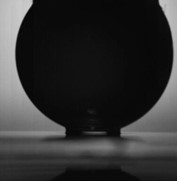Advance grease lubrication based on liquid infused surfaces – Bachelor’s assignment
Overview
Grease is the most widely used lubricant in the world for rolling bearings. It guarantees smooth and sustained operation of bearings in many industrial applications. Grease is a soft material that consists of a network of self-aggregated fibres or platelets of a ‘thickener’ (often salts of fatty acids) that retains lubricating oil like a sponge. Its function is to store and gradually release oil towards the contact zone where it reduces friction and wear by preventing direct contact between bearing balls and their ‘rolling track’. While the fast squeeze-out of oil in the contact region has been studied in detail for decades, the physical mechanisms governing the slow continuous release of oil from the grease towards the rolling track, which is essential for the long-term performance and reliability of bearings, have remained poorly understood and controlled. Therefore, the motivation and goal of the grease lubrication project is to develop a comprehensive physical picture of the oil release (or: ‘bleeding’) process.



Figure 1. Schematic of the growth of the liquid interface in time
Research objective
Your research objective will be to quantify the growth of a so-called: ‘depressed area’ in time. To study the growth of this depressed area, you will make use of two high speed cameras and an inverted microscope, which allows one to view the liquid interface from underneath the bearing ball. Specifically, we’re interested in the behavior of the depressed area under various conditions, e.g., oil viscosity, film thickness, ball size, ball height, etc. Depending on your expertise and/or interest, you can either do the required image analysis by hand or by image analysis software (Python/Matlab).
Learning objective
In addition to the standard learning objectives for a bachelor’s project, you will:
· Learn basic chemical-lab skills (dip-coating, spin-coating, etc.).
· Learn how to use high speed camera’s and Matlab/Python tracking software
· Learn fundamental concepts of capillarity
Contact information:
Daily supervision: Vincent Siekman. Researcher
Supervision: Prof. Dr. F.G. Mugele (Frieder)
